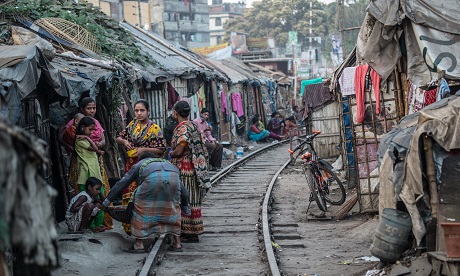The Covid-19 (coronavirus) pandemic will make the poor in Bangladesh even poorer, say economists.
About 50 million people who live slightly above the poverty line (i.e. those earning more than US$2 a day) may fall below the line because of the pandemic.
In the past, natural disasters and climate change effects were the main drivers of poverty in Bangladesh.
However, pandemic has impacted all sectors in the country, says Zahid Hussain, who is a World Bank economist.
The most affected will be those involved in unorganized labor sectors.
These sectors include daily laborers, transport workers, rickshaw pullers, restaurant workers and small businesses.
About 20 percent of Bangladesh’s more than 160 million people are poor.
An additional 10.5 percent are extremely poor, a 2019 study by the Bangladesh Bureau of Statistics says.
The study calculated people’s ability to buy and consume kilocalories of food instead of gross income or purchasing power parity.
Anu Muhammad, a professor of economics at Jahangirnagar University, thinks up to 80 million poor people in Bangladesh will be drastically affected by the pandemic.
“We have always cast doubts on the government’s definition of poverty as we believe the real figure was even higher.”
“Despite a government stimulus package for industrial and agricultural sectors as well as relief programs, the real poor are unlikely to benefit and survive,” he says.
“Corruption will eat out whatever is for the poor unless we fix the system that deprives them.”
“This global crisis is also a result of an unequal global system, and the world must learn a great lesson and abandon the development of wastage such as arms, plastics and nuclear weapons.”
Holy Cross Father Liton H. Gomes, a social researcher and rights activist says a greater focus on Bangladesh’s recovery and support for vulnerable communities is needed.
Father Gomes, secretary of the Catholic bishops’ Justice and Peace Commission agrees.
“The government has come up with stimulus packages, and we need to ensure the support reaches those who need it badly. This might improve the situation for hard-hit people,” he says.
“In the aftermath, in our country and across the globe, we should follow the economic model of less production and less consumption, and this can lead us to a better and more equal world.”
Catholic charity Caritas Bangladesh has distributed hygiene kits, masks and cash handouts in eight regional working areas.
It is making plans for better and creative projects to address urban and rural poverty.
This will involve prioritising income-generating and self-employment projects to help people in Bangladesh fight poverty effectively.
Source
- UCA News
- Image: LightCastle Partners
